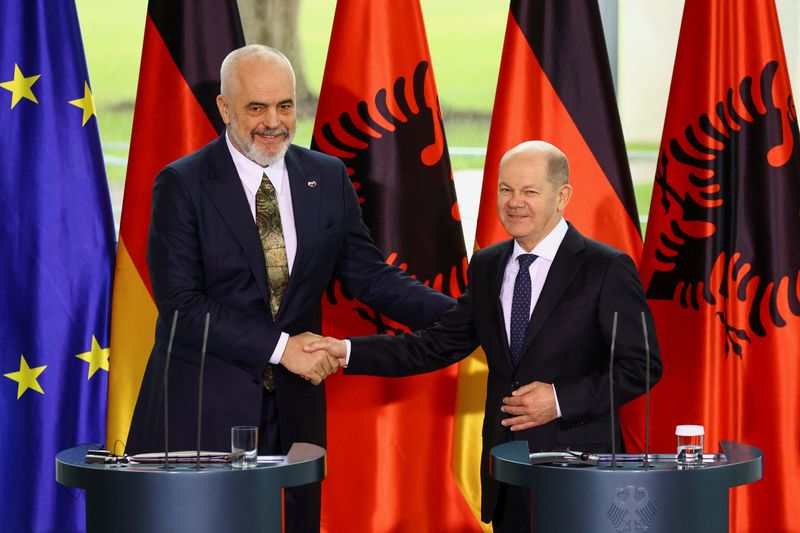Gold prices set for weekly gains on dovish Fed outlook; silver near record high
BERLIN (Reuters) - German Chancellor Olaf Scholz said on Tuesday he saw a "great willingness" to normalise relations between former wartime foes Serbia and Kosovo, and held out the prospect of constructive results soon from a tentative EU-brokered deal.
After hosting talks between the Serbian and Kosovo government leaders, EU foreign policy chief Josep Borrell said on Feb. 27 they had "agreed that no further discussions are needed" on an EU proposal to put their relations on a path to normalisation.
The text of the basic agreement was not signed by the leaders, however, and it subsequently became clear that none of the key players saw it as set in stone yet.
But Scholz gave an upbeat assessment at a news conference in Berlin with his visiting Albanian counterpart Edi Rama.
"I assume that we will soon achieve good and constructive results," Scholz said. There is a great willingness to make possible now what seemed impossible for so long - it would be good for peace, but also for development in Kosovo and Serbia."
Kosovo declared independence in 2008, almost a decade after a guerrilla uprising brought an end to repressive Serbian rule. But Belgrade still regards Kosovo as a breakaway province and flare-ups of conflict between Belgrade-backed minority Kosovo Serbs and Pristina have stoked fears of a return to conflict.
"Albania welcomes the plan between Kosovo and Serbia - this is a realistic plan that brings necessary and long-awaited normalisation," said Rama. "Both parties should treat this plan with the maximum seriousness and with necessary courage."
The EU plan does not commit Serbia to recognising an independent Kosovo but it would recognise documents such as passports, diplomas and licence plates and would not block Kosovo's membership of any international organisation.
The toughest issue to be tackled in talks on an implementation annex to the deal is a proposed association of Kosovo municipalities where ethnic Serbs form a majority.
Serbian President Aleksandar Vucic and Kosovo Prime Minister Albin Kurti will face renewed international pressure to consummate the deal when they meet in North Macedonia on March 18, with the EU once again the facilitator.
Also on Tuesday, Scholz said Germany wanted to welcome Western Balkans countries into the European Union as soon as possible and that Albania was making good progress towards membership.
"Bilateral relations between Germany and Albania are excellent," Scholz told reporters, and his government would remain a "reliable partner" in Tirana's quest to join the EU.
